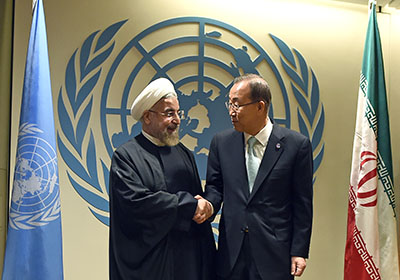The Committee to Protect Journalists joined 25 human rights and civil society groups today in signing an open letter to Iranian President Hassan Rouhani, who is due to address the United Nations General Assembly on Thursday about steps toward an open and effective relationship with the United Nations Special Procedures of the Human Rights Council.
The letter calls on Rouhani to invite Ahmed Shaheed, the special rapporteur for human rights in Iran, to visit the country, and for Iran to honor its commitment to cooperate with the United Nations’ Universal Periodic Review. The letter also highlights concerns about arbitrary detentions and restrictions on the press and freedom of expression in Iran.
Iran’s failure to cooperate with U.N. human rights mechanisms is matched only by its failure to resolve its five-year crackdown on the press. Rouhani, who has promoted international engagement and called for national dialogue among parties in Bahrain and Syria, still denies open dialogue and engagement to his own people.
Since he came to power in August 2013, his administration has consistently taken repressive measures against the press and continues to detain journalists, according to CPJ research. The cases include some who have been detained in what can be described only as juridical kidnapping. In one of the more recent cases, Jason Rezaian of The Washington Post and his wife, Yeganeh Salehi, of The National, continue to be detained without charge and denied access to lawyers, two months after their arrests.
On Tuesday, Rouhani said the judiciary has “not yet made a determination” about Rezaian’s case, but that he put trust in it to “resolve the case fairly,” according to news reports. On the same day, the independent online news website IranWire reported that the journalists had made forced confessions on film. The news website did not state what was included in the forced confessions, and said it was not clear when the film would be broadcast. The International Campaign for Human Rights in Iran said on Monday that Rezaian and Salehi have lost a “shocking” amount of weight in prison, and quoted sources close to the family, who have finally been allowed to visit them in prison.
Their case, along with dozens of others of jailed journalists, show Rouhani has a long way to go to improving human rights in Iran. While Rouhani, alone, remains “hopeful” after his first year in office, the Iranian people, human rights groups, and the international community at large are starting to lose faith in his administration and doubt his frequent calls for engagement.
